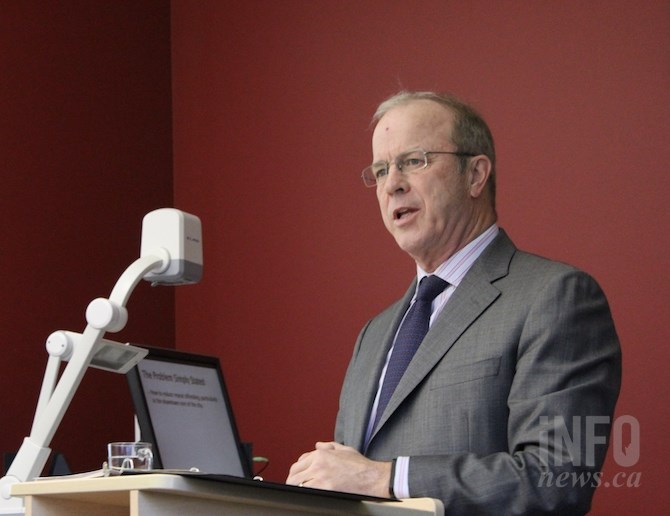
Former B.C. Supreme Court Judge Geoffrey Barrow when he spoke to Kelowna city council in 2019.
(ROB MUNRO / iNFOnews.ca)
November 28, 2021 - 10:33 AM
After six months in operation, Kelowna’s new integrated court is proving the model works, says a judge who helped create it.
It’s just that more housing is needed to help those who go through the court and more court time could make it an option for a larger number of people.
It started operating May 6 and has dealt with 22 individuals who were responsible for 226 case files.
“Most of the substantive offences have stopped or dramatically declined after the individual has come before the court,” retired B.C. Supreme Court Justice Geoffrey Barrow, a chief architect of the court over the years it took to set up, told Kelowna city council earlier this week.
READ MORE: Community Court poised to return to Kelowna after six-year absence
In order to qualify for the court, the person must have a “minimal desire to try to address what’s going on that’s causing the criminal offending,” and have underlying issues such as substance use, mental health and/or homelessness.
The criminals will have pleaded guilty before going to court, which is a sentencing court only. The process includes a dedicated police officer, psychiatric nurse, social worker, Crown prosecutor and a judge. Different lawyers represent different clients.
“This is not a get out of jail free court,” Barrow said. “Frequently jail is required and if it’s required it’s imposed.”
The whole process is more efficient because all parties are in the room together but it also serves to change the way the criminals react to the courts and can help them turn their lives around.
“The types of folks that we’re working with, who are before the courts, may have a brain injury, may have had substantial trauma throughout their lives, may suffer from serious or significant mental illness that may or may not be treated and substance use and homeless on top of that,” Steven De Luca, justice services coordinator for the John Howard Society, which plays a key role in the court, told council.
"These are folks who are dealing with a lot of things.”
He gave some examples of who the court is dealing with.
“One example I’ll share is an individual who had quite severe mental health issues and was quite deep in addictions as well,” he said. “With this one stop shop idea, they had probation meetings every week and they were able to tack their antipsychotic injection onto one of those days and this was the first time this individual actually accepted mental health treatment so they were able to tease apart the mental health versus the substance use. It’s a long road but it’s a start.”
The judge speaks directly to the client and takes much of the formality out of the process.
“A number of quite street entrenched individuals were struggling with substance use and mental health,” De Luca said. “The judge provided them with the space to speak and share their story and afterwards we asked them how that felt for them and they, on a few different occasions and a few individuals, said that was the first time they felt heard in court. It’s nice to see they’re gaining trust for the court and that we’re there to supply support. They’re really getting a sense that the court is there to not just sentence on the offence but to look at the struggles that kind of led up to the offence itself and address those."
While it usually means the criminals go to jail, that gives them the time to get off drugs for awhile and make a fresh start.
It’s when they come out of jail that more help is needed.
“When they’re released, the shelters are full, B.C. Housing wait list is long, market housing is a challenge at best,” De Luca said. “It’s becoming more and more frequent that individuals are going straight to the street out of corrections.”
Even were housing available, shelters and supportive housing units are not necessarily suitable for people with complex needs and there’s not enough treatment facilities for drug or alcohol addiction.
While the lives of 22 people may have been improved through the community court system, it’s estimated that there are 200 to 300 street-entrenched people who could apply to go through the community court if there were more resources, Barrow said.
Kelowna's community court is one of very few in B.C. but Kamloops is looking into setting one up there, Barrow said.
The court sits every Thursday morning at 9:30 a.m. in Courtroom 9 and is open to the public, as are most courtrooms.
READ MORE: Plan to help the homeless could save the province millions of dollars every year in the Okanagan
To contact a reporter for this story, email Rob Munro or call 250-808-0143 or email the editor. You can also submit photos, videos or news tips to the newsroom and be entered to win a monthly prize draw.
We welcome your comments and opinions on our stories but play nice. We won't censor or delete comments unless they contain off-topic statements or links, unnecessary vulgarity, false facts, spam or obviously fake profiles. If you have any concerns about what you see in comments, email the editor in the link above.
News from © iNFOnews, 2021